Apple variety Dialog (columnar)
The attitude towards columnar apple trees is sometimes ambiguous. On the one hand - aesthetics, space saving, productivity. On the other hand, there is distrust of an unfamiliar culture, because not every garden contains this slender tree. The pioneer of the selection of columnar apple trees in the USSR was the scientist-breeder V.V. Kichina. He began his work in this direction in 1972. Thanks to the work of the scientist, domestic gardeners got acquainted with beautiful plants, one of which is the Dialogue, co-authored with M.V. Kachalkin. In 1985, scientists crossed the columnar donor KV 102 with the Brusnichnoe variety, which acted as a winter hardiness donor. As a result of the experiment, in 1992, a seedling number 330/43 was selected, which since 1999 has become known as Dialogue. An application for registration of a novelty in 2001 was received from the All-Russian Institute of Selection and Technology of Horticulture and Nursery. The variety was entered into the State Register of Breeding Achievements of Russia in 2004. The admission was obtained for the Central Region, which includes 8 regions: Bryansk, Vladimir, Ivanovo, Kaluga, Moscow, Tula, Ryazan, Smolensk.
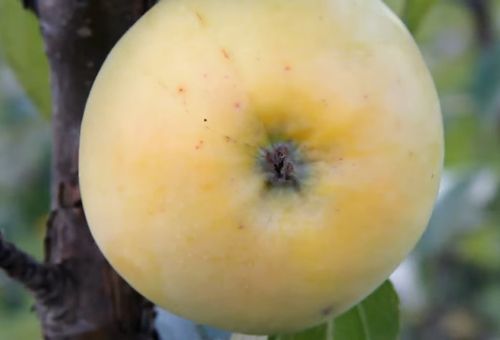
Description
The plant is fast-growing, small-sized and compact. Height is about 2.5 meters. The crown of the apple tree is dense, columnar type. Shoots are thick, rounded, brownish-brown bark, glabrous. Lentils are light, small, in small quantities. The arrangement of the shoots is compact. Leaves are medium in size, obovate, slightly curved along the central vein. The petiole is ordinary, uncolored. The flowers of the variety are white.
The fruits of the Dialogue are of regular shape, flat-round, one-dimensional, weight according to the State Register of 110 - 140 grams. In other sources, the weight is described a little less - from 70 to 100 grams. The skin is thin, but strong enough, the basic color is pleasant, light yellow. The integumentary is absent, only sometimes a slight crimson spot can appear. Due to their small size and gray color, the subcutaneous points are weakly visible, there are very few of them on the surface of the fetus. The pulp is white, medium density, juicy, prickly, fine-grained consistency. The peduncle is short. The saucer is wide, shallow, closed cup. The taste is of high dessert quality, sweet and sour, and the sourness is the leading one, the aroma is pleasant, but moderately pronounced. Assessment of tasters - 4.8 points.
Characteristics
- During the fruiting period, Dialogue, as a rule, begins in the 3rd year after planting;
- in terms of ripening, the variety belongs to the summer. Harvesting begins in late July or early August, depending on weather conditions;
- the period of the tree's productive life is about 15 years, after which it will need to be replaced;
- the productivity of a compact tree is very high - 80 - 100 t / ha or 5 - 6 kg per plant with standard care. With an increase in the agricultural background, the yield also increases proportionally. During the tests, the yield of this apple tree was almost 20 times higher than that of other varieties, including English, which were considered the most promising in this regard throughout the world;
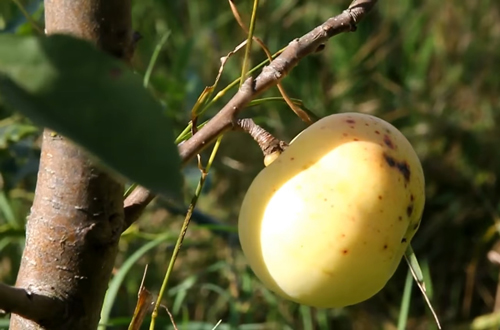
- winter hardiness is amazing, at the level of the famous Antonovka. During the creation of the variety, the author set himself the task of instilling in the plant the ability to withstand the adverse effects of the environment in the winter. Therefore, according to some reports, Dialog winters well at -40 ° C. If we take the climatic conditions of the Central region of Russia, in which the culture is zoned, then the average winter temperatures of -15 ° C can be considered very comfortable, especially since severe frosts down to -30 ° C are short-lived;
- drought resistance - not such a strong quality of the apple tree, but it fits well into the average parameters;
- the immunity of the variety is quite high. Perhaps the main advantage of the variety is its high resistance to scab;
- the transportability of the fruits of the Dialogue is not bad. Keeping quality, if you take into account the summer ripening period, is also not bad - apples can be stored for a month.During this period, they need to be eaten or processed;
- the way of using the crop is universal. The taste qualities of the fruits of this apple tree are considered dessert, therefore apples are consumed in their natural form. Although the taste of early apples cannot be compared with autumn fruits, our hero is undoubtedly the leader in this indicator. You can also use the fruits for processing, for example, make fruit puree or jam from them.
Pollinators
Unfortunately, our hero is self-infertile. Therefore, for its pollination, varieties that bloom at the same time as it are selected. It is desirable that there are at least 2 of them. Given their compact size, they will not take up much space in the garden.
Planting and leaving
The columnar apple tree is a rather capricious plant. Therefore, when choosing a seedling, pay attention to the stock, because it will not bloom well and bear fruit at all. Dialogue is no exception. The variety works well on dwarf and semi-dwarf rootstocks such as MM 106, M9, МАРК, 62−396. For planting, try to purchase one-year or two-year seedlings. In the Central region, planting of the variety can be carried out both in spring and autumn. Prepare the landing pit in advance. For spring planting - from autumn, for autumn planting - at least a month before the process. The site must be well lit and protected from the prevailing winds. This is especially important in winter, as the wind can dry out the wood. The seedlings are watered abundantly in spring and summer, but in damp weather, the amount of moisture should be reduced so that the roots do not suffer from waterlogging. Young trees require more nitrogen, for those that have entered the fruiting period, the amount of nitrogen is reduced in favor of phosphorus-potassium supplements. Planting density 50 × 50 cm. This arrangement helps to significantly save space in small gardens.
Dialogue is an amazing plant that has a decorative look and is capable of producing crops. The columnar shape will help to place this variety in any garden area. Taking care of an apple tree is quite easy, thanks to its small growth, compact crown, excellent level of winter hardiness and high immunity. Harvesting from a small tree is also not difficult. A big plus of the variety is a decent yield, which can compete with the varieties popular in the world. But there are also disadvantages that largely determine the unpopularity of columnar cultures. And self-infertility is not the biggest of them. On an incorrectly selected rootstock, Dialog will not bear fruit for a long time. In addition, the lifespan of a columnar apple tree is not as long as that of ordinary fruit trees, and this leads to the need to buy, plant and form a tree more often.
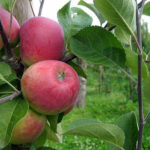

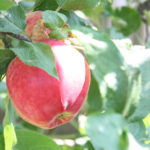
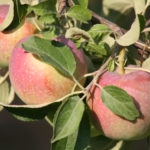
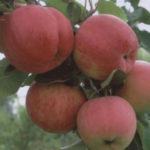
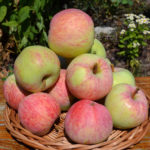



I treat new seedlings, like everyone else, probably with apprehension. But here the unusual compactness of the tree won over. And what is already bearing fruit in the third year. I bought a two-year-old sapling. I didn't take much care, I go to the country house 1-2 times a week. Delicious fruits. Was not allowed for processing. Only for "momentary" pies and compotes.
I got the first apples, I liked it, but I flew by pruning, this year I will fix it, the side branches have grown up to 50 cm, they break under the weight of the apples, I had to tie it up, the variety is good, fruitful
What a cut on the column !!!
The lateral ones have grown, probably because the upper part of the seedling, the upper growth bud, was broken off.Then the columnar apple tree begins to bush, and turns into a kind of dwarf one.
Now, of course, it can't be fixed. Don't try to turn it back into a column, it won't work.
Bon appetit and good harvests!
Awful sort. I have not seen worse. Uprooted from the site and planted near the entrance. It's a pity to throw it out. Better proven old ones than new ones.